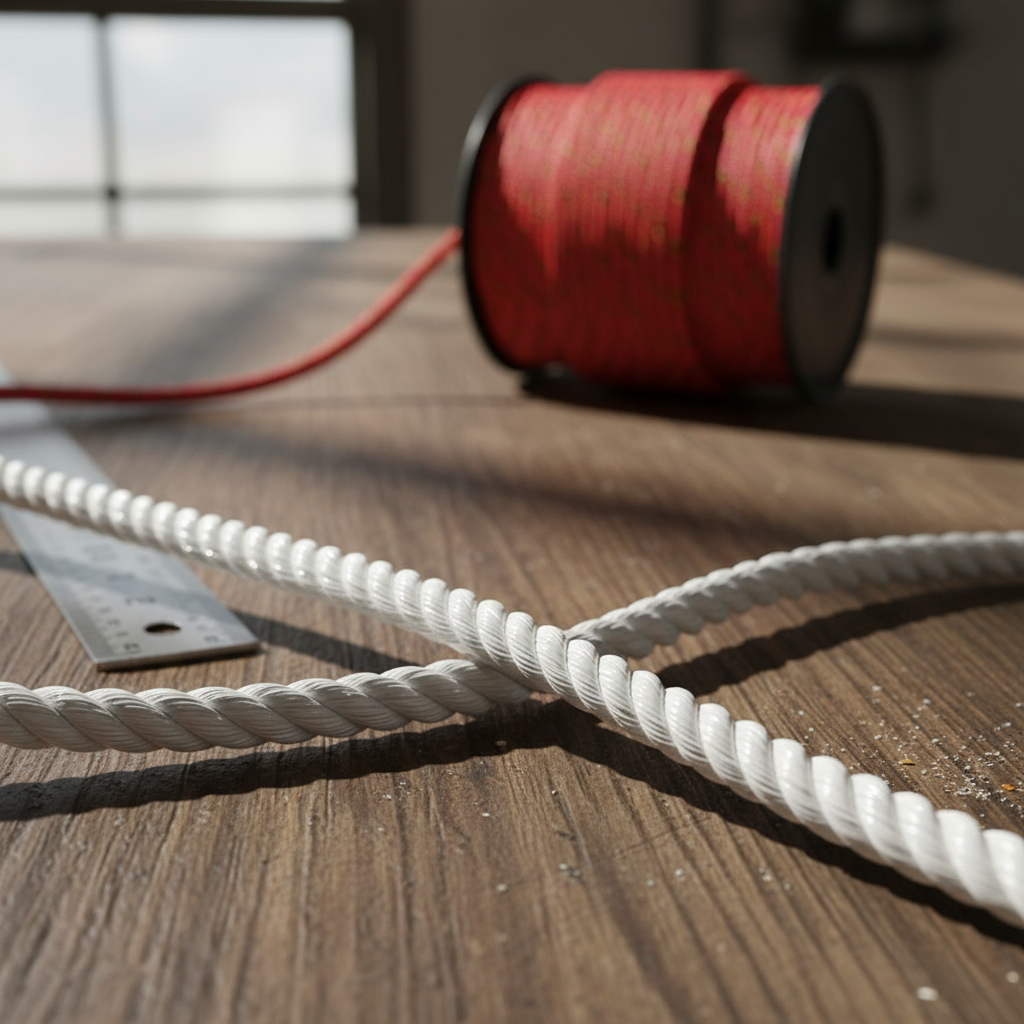1‑inch polyester rope typically delivers ~42,000 lb break strength with about 2% elongation at working load—a pre‑stretched, low‑stretch line with a soft hand for controlled handling.
Key gains – read in 3 min
- ✓ Low‑stretch control: Around 2% elongation at working load helps keep loads steady and predictable.
- ✓ Heavy‑duty strength: Approx. 42,000 lb break strength; select an appropriate safety factor to set the working load limit.
- ✓ Durability advantage: UV, abrasion and moisture resistance support long service in harsh environments.
- ✓ Custom OEM/ODM: Tailored colour, length and accessories, backed by ISO 9001 quality and global delivery.
Many teams still rely on steel cable for heavy pulls. However, modern 1‑inch polyester rope offers impressive pulling power with controlled stretch and easier handling. In this guide, we explain construction choices and OEM/ODM options that turn a standard line into a dependable, application‑specific solution for wholesale buyers.
Understanding twined rope: 3‑strand twisted polyester basics
Building on the need for a reliable, low‑stretch line introduced earlier, let’s look at the construction that gives the 1‑inch polyester rope its proven durability: the twined rope.
Twined rope commonly refers to a rope made from three individual polyester strands that are twisted together in a helical pattern. Each strand is a bundle of fibres, and the three strands wrap around one another to form a single, cohesive line. This 3‑strand twisted layout is simple yet robust, allowing the rope to retain shape while offering a soft hand feel.

The twisted geometry brings several practical benefits that make twined rope a favourite for demanding jobs.
- UV resistance – polyester fibres naturally withstand prolonged sun exposure with minimal degradation.
- Low stretch – the three‑strand design and material choice limit elongation, ensuring consistent load control.
- Abrasion resistance – the tight twist helps distribute wear across all strands, extending service life.
Because of these attributes, twined rope is commonly chosen for cable pulling in utilities, tree‑work rigging where precise tension is vital, and general‑purpose utility tasks such as securing loads or creating temporary handholds.
“Twisted rope” describes any rope made by twisting strands. In practice, “twined rope” often refers to the classic 3‑strand twisted construction; here we focus on polyester versions for low‑stretch, durable performance.
Understanding how the three‑strand twisted build contrasts with braided designs helps you choose the right line for projects that demand low stretch, UV stability, and reliable abrasion performance. This foundation sets the stage for comparing twined rope against metal alternatives in the next section.
wire and rope comparison: Why 1‑inch polyester outperforms metal options
Building on the three‑strand insight, we now turn to the classic “wire and rope” debate. Metal cable has long been the go‑to for heavy pulling, yet the modern 1‑inch polyester rope offers high strength with advantages many projects can’t ignore.

When a contractor asks whether “wire and rope” will hold up under a demanding load, the answer hinges on four performance pillars. The first three appear below, while the fourth – cost of ownership – follows naturally from the same data.
- Strength
- Stretch
- Durability & corrosion resistance
Strength. A 1‑inch polyester rope typically breaks around 42,000 lb. While exact comparisons depend on construction, the synthetic line delivers high pulling power for many tasks and weighs far less than steel.
Stretch. Wire rope has very low elastic elongation. Polyester also maintains low elongation (often around 2% at working load), giving operators predictable control with the benefit of greater flexibility and easier handling.
Durability & corrosion resistance. Steel can rust and requires ongoing corrosion control, whereas polyester is UV‑stabilised, resists most common chemicals, and is immune to rot and mildew. In marine settings, polyester avoids corrosion concerns altogether.
There are still niches where metal rope shines: high‑temperature exposure, where polyester’s melt point is a concern, or scenarios requiring specific stiffness characteristics. In those cases, stainless‑steel cable retains its edge.
Addressing a common query – “Is polyester rope better than nylon rope for certain applications?” – the answer is yes. Polyester’s lower elongation and superior abrasion and UV resistance make it preferred for static loads, marine mooring, and long‑run cable pulling, whereas nylon’s higher elasticity suits shock‑absorbing uses.
By weighing strength, stretch, and longevity side by side, it becomes clear why many wholesale buyers consider the versatile 1‑inch polyester rope as an alternative to traditional metal cable. The next part of our guide explores the specifications that make this rope a heavyweight performer in heavy‑duty contexts.
Key features of 1 inch polyester rope for heavy‑duty use
Beyond headline strength figures, the 1‑inch polyester rope distinguishes itself through engineered details that deliver consistent performance day after day.

In iRopes’ standard configuration, 1 inch polyester rope is double braid: a braided polyester core with a polyester 24‑plait cover. This quality rope is pre‑stretched, flexible, retains its shape with use, and is durable, economical, and soft in the hand. Pre‑stretching reduces constructional elongation so the line maintains length under load. The jacket’s smooth finish aids handling, spooling, and knotting.
Core & Cover
A braided polyester core provides the tensile backbone, while a 24‑plait polyester jacket adds abrasion protection and a supple feel. Pre‑stretching removes most constructional stretch for stable, repeatable performance.
Because the construction is synthetic rather than metallic, the rope resists rot, mildew and most chemicals encountered in industrial or marine environments. Its low‑stretch behaviour translates into precise tension control for lifting and rigging, while the soft hand reduces fatigue during prolonged handling.
For safety planning, distinguish break strength from working load limit (WLL). With common design factors (for example, 5:1), a ~42,000 lb break strength equates to an indicative WLL around 8,400 lb. Always follow your applicable standards and site‑specific safety factors.
When users ask, “What are the main uses for 1‑inch double braid polyester rope?” the answer centres on tasks that demand high static load capacity and minimal elongation: heavy‑duty winching, capstan feeding, block‑and‑tackle lifting, offshore mooring lines, and large‑scale cable pulling for utilities.
Performance
What the line delivers
Minimal Elongation
Pre‑stretching keeps elongation around 2% at working load, giving operators tight control.
Soft Hand
The 24‑plait jacket feels smooth, reducing hand fatigue and easing knot‑tying.
Chemical & Mildew Resistance
Polyester’s inert nature helps ward off rot and most industrial chemicals.
Construction
How it’s built
Braided Polyester Core
A high‑modulus braided core forms the load‑bearing backbone.
24‑Plait Jacket
Twenty‑four tight plaits wrap the core, delivering abrasion protection and shape retention.
Pre‑Stretched Finish
Constructional stretch is minimised before delivery for consistent in‑service length.
These built‑in advantages set the stage for iRopes’ next topic: how the company tailors this robust 1‑inch polyester rope to exact wholesale specifications through OEM and ODM programmes.
Customization, OEM/ODM services, and iRopes partnership
Building on the performance details just covered, iRopes turns the robust 1‑inch polyester rope into a truly bespoke solution for wholesale buyers. Whether you need a specific colour to match safety standards or a pre‑fitted eye splice for rapid deployment, the company’s OEM (original equipment manufacturer) and ODM (original design manufacturer) programmes adapt every parameter to your project.

Can you order a rope that’s exactly 600 ft long, dyed in corporate blue, and terminated with a stainless‑steel thimble? Absolutely. iRopes lets you define material blends (pure polyester or poly‑dacron), select from a palette of standard safety colours or provide a custom match, and specify any length from single‑foot cuts to full‑spool rolls. Accessories such as loops, eye‑splices, or reinforced terminations can be added on the production line, so you receive a ready‑to‑use line straight from the factory.
Material & Colour
Choose pure polyester or a poly‑dacron blend, and request any hue—from high‑visibility orange to your brand’s exact shade.
Length & Accessories
Order precise lengths or bulk spools, and add loops, thimbles, or eye‑splices directly during manufacture.
ISO‑9001 Quality
Every batch undergoes strict inspections, delivering consistent break strength and the low‑stretch performance you expect.
Global Delivery
Pallets are consolidated and shipped directly to your dock, with full IP protection for your proprietary designs and non‑branded or customer‑branded packaging options.
For customers who already use twined rope in demanding environments, the same custom‑build process applies—only the colour or accessory set changes, while the core performance remains consistent.
Ready to optimise your supply chain? Request a free quote today and let iRopes engineer a rope solution that fits your exact specifications.
With these options in place, the next logical step is to consider how partnering with iRopes can accelerate project timelines while keeping costs predictable.
Need a tailor‑made rope solution? Get expert advice below
For a customised quote or technical guidance, simply complete the form above and our rope specialists will reply promptly.
For projects that demand low‑stretch, UV‑stable performance, the double‑braid 1 inch polyester rope—built with a braided polyester core, a polyester 24‑plait cover and a pre‑stretched finish—delivers flexible, soft‑hand handling while retaining its shape over repeated use. Its high breaking strength, abrasion resistance and cost‑effective durability make it ideal for heavy‑duty lifting, marine mooring and cable pulling.
Whether you’re comparing twined rope to other options, weighing wire and rope alternatives, or specifying custom colours, lengths and accessories, our OEM/ODM team can engineer the exact line you need. Use the form above to discuss your requirements and receive a personalised quote.























